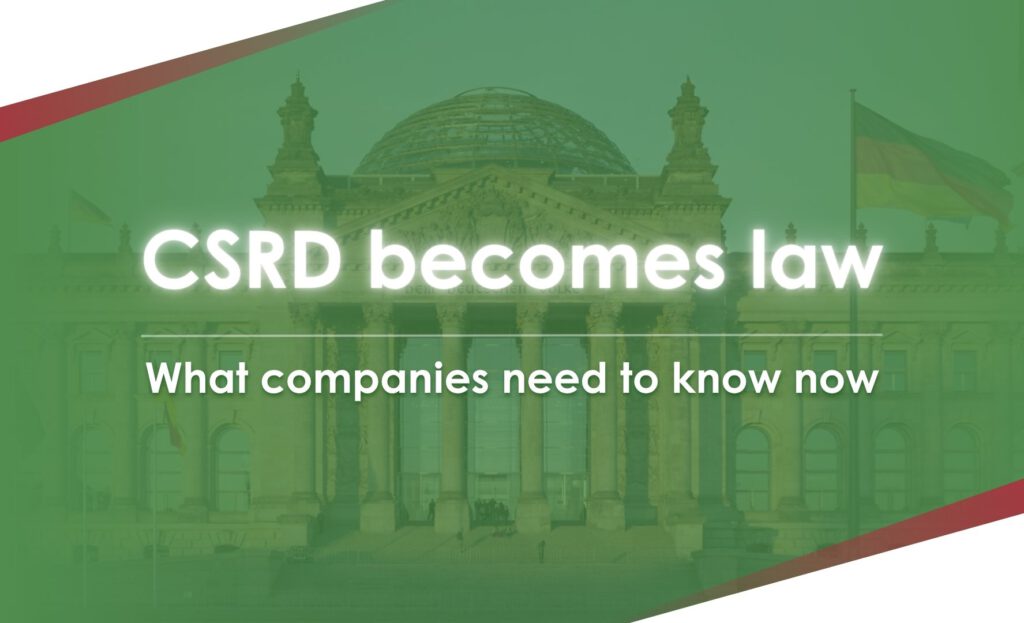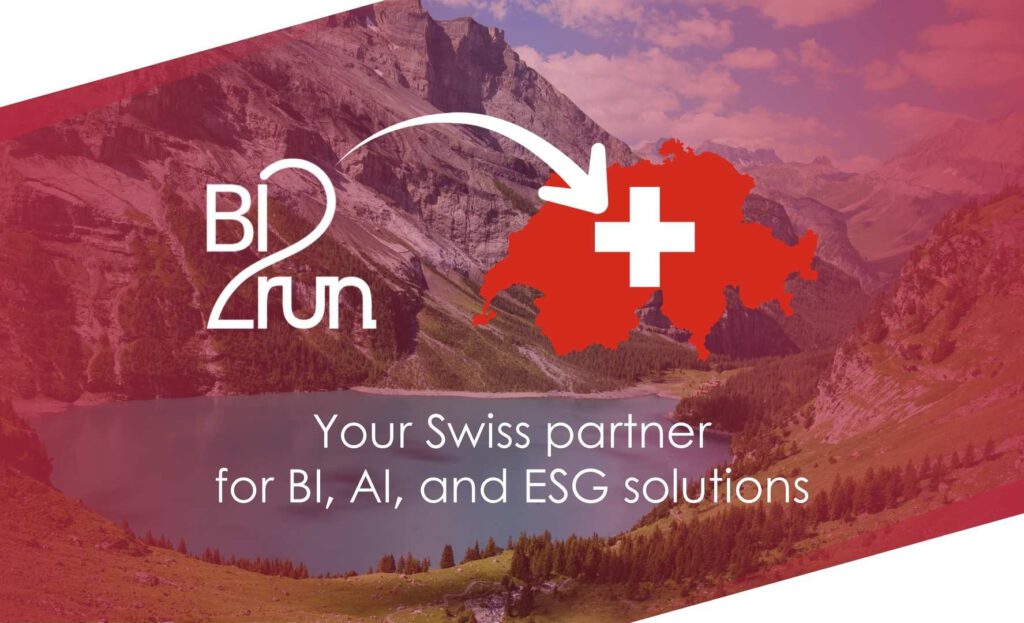Sustainability is becoming concrete. What was yesterday considered a “voluntary commitment” is now a legal obligation. However, legal terms such as “CSRD Implementation Act” conceal questions that directly affect companies: What is in store for us? What will really change? And how do we prepare ourselves without detours and unnecessary effort?
1. Why is the new CSRD so relevant?
On July 10, 2025, the German government presented the revised draft law to implement the European CSRD Directive. This marks the official start of the national legislative process – one year later than originally planned.
Things are getting serious for many SMEs: in the coming years, more and more companies will be obliged to report on sustainability issues in a structured manner, and this will be required by law. The sustainability report will become part of the regular management report and must be audited by auditors.
Even if the new draft brings some relief, such as fewer affected companies and deferrals for smaller SMEs, the need for action remains high. Those who prepare their processes, data and responsibilities for the new obligation now will save effort later and can use ESG as a competitive advantage.
2. Why was a new attempt necessary and what is the political background?
Germany should actually have transposed the CSRD into national law by July 6, 2024. However, the first draft did not make it through parliament due to the change of government in 2024. In such cases, the so-called discontinuity principle applies. Legislative procedures must be re-initiated with a new government.
With the new draft, the German government is also taking into account another EU directive: “Stop the Clock”. This allows certain companies to be temporarily exempted from the reporting obligation.
The most important changes at a glance:
- Companies with 501-1,000 employees do not have to report until 2027 – they are exempt for 2025 and 2026.
- The number of companies affected will fall to around 3,900 – originally it was expected to be over 15,000.
- The estimated annual expense is now around 430 million euros – previously it was expected to be up to 1.7 billion euros.
- Further relief from the EU’s so-called omnibus procedure has been incorporated into the draft.
The law is to come into force immediately after promulgation. Some regulations, for example on quality control, will apply from January 1, 2026.
3. What is in the draft and what do companies need to be prepared for?
The draft law is closely based on the EU requirements. This means that there will be no additional special german rules, but the requirements are extensive.
The most important things at a glance:
- The sustainability report becomes part of the management report (§ 289b HGB-E) and must be prepared in accordance with the binding European ESRS standards.
- The audit will be carried out exclusively by the auditor. Initially, an “auditor’s review” will suffice, but a full audit is foreseeable at a later date.
- New obligations in the HGB:
- Annual financial statements must be signed upon preparation (Section 245 HGB-E)
- Companies must include intangible assets such as know-how or software in the report
- The corporate governance statement will be expanded, e.g. on diversity or ESG remuneration
Many companies have to set up completely new structures for this: in terms of content, technology and organization.

4. Who is affected and when does the reporting obligation apply?
The CSRD does not apply to all companies at the same time. The draft law provides for a staggered introduction in so-called “waves” – depending on size and capital market orientation.
| Type of company | Reporting obligation from | Exception possible |
| Large, capital market-oriented companies (>500 employees) | Financial year 2025 | Yes, for 501-1,000 employees: 2025 & 2026 excluded |
| Large companies, not capital market-oriented | Financial year 2027 | No |
| Listed SMEs | Financial year 2028 | Yes, voluntary deferral possible until 2029 |
| Small and medium-sized companies (not listed on the stock exchange) | Not yet affected | Indirect obligations through supply chain, if applicable |
Note on the exception for 501-1,000 employees:
The relief for 2025 and 2026 only affects large, capital market-oriented companies with between 501 and 1,000 employees. They must then submit their first sustainability report for the 2027 financial year. For all others, the general grading according to size and stock market listing applies.
5. What are the biggest hurdles?
Many medium-sized companies face similar challenges:
- Data situation: ESG key figures are often not systematically collected or evaluated.
- Supply chain data: Information from partners and suppliers is needed for many requirements.
- IT systems: Spreadsheets are no longer enough – integrated solutions with reporting logic are needed.
- Auditability: All information must be documented and auditable – just like the annual financial statements.
6. How can companies prepare?
The earlier companies deal with CSRD, the better. These five steps have proven themselves in practice:
- Check relevance: Does the reporting obligation apply? If yes: from when?
- As-is analysis: Which ESG data is already available, which is missing?
- Evaluate systems: Check existing tools or introduce new solutions such as those based on IBM Planning Analytics (PAW).
- Define processes and responsibilities: Sustainability data needs structure and clear roles.
- Use external support: Consulting saves time, avoids errors and ensures quality.
7. How we can support you
The CSRD is not a voluntary marketing exercise. It is a legal obligation. But it can also be a strategic lever: for trust, competitiveness and sustainable growth.
We support companies with a holistic ESG consulting approach, from legally compliant gap analysis to implementation in the system. Our solutions are based on state-of-the-art technology (e.g. IBM PAW) and are optimized for the challenges of medium-sized companies.
Do you want to know how well prepared your company is? We offer a compact ESG readiness check: simple, well-founded and implementation-oriented.
Conclusion: The draft law is in place
The CSRD has been in place at European level since the end of 2022, but it will only become binding and legally applicable with clear deadlines, reporting obligations and auditing requirements with the new German draft law from July 2025.
For many SMEs, this means that the sustainability reporting obligation is no longer theoretical. It is now written in black and white in German law.
Implementation will require time, resources and good preparation. Those who start early can not only meet legal requirements, but also reap the benefits: better data quality, more transparency towards stakeholders and a clearer ESG positioning in the market.
Now is the right time to take a structured approach with sound advice, suitable tools and a clear implementation plan.








